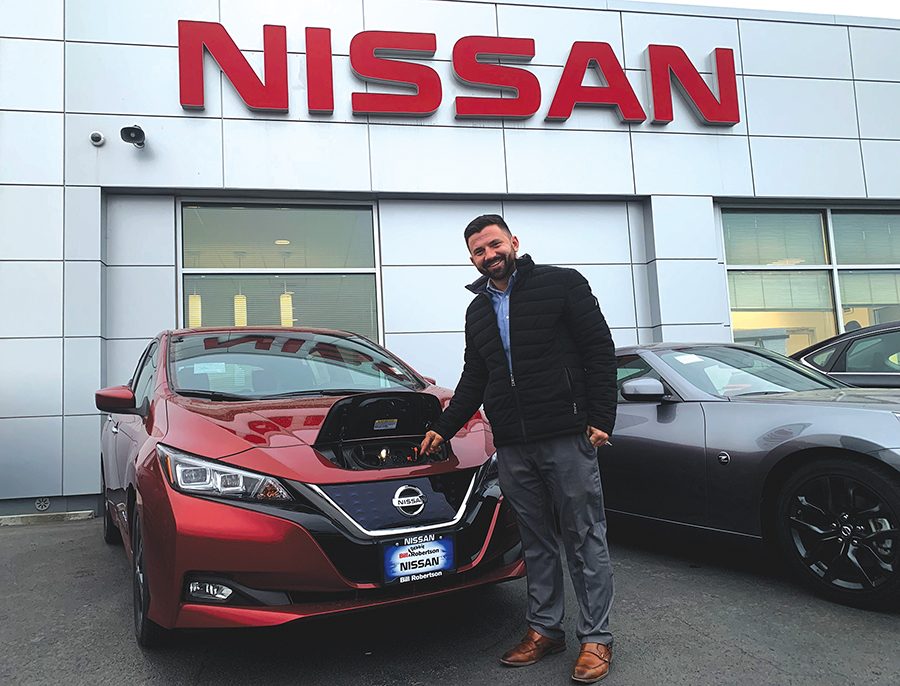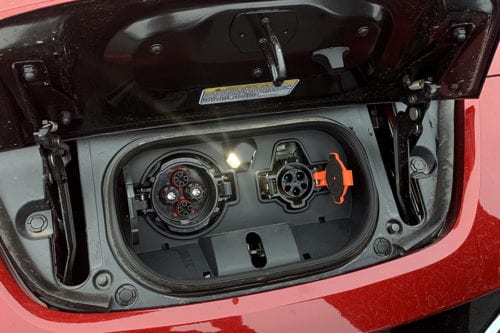
Home » Better batteries likely to drive electric car market
Better batteries likely to drive electric car market

December 16, 2019
By Andrew Kirk
With a nuclear reservation, national laboratory and cutting-edge agricultural processing in the Tri-Cities’ backyard, Jeff Leskovar expected Mitsubishi’s plug-in hybrid electric vehicle Outlander would be well received.
“We thought they’d be
popular with Hanford scientists, a high-tech product like this,” he said. “But
we sell a lot of them to Spokane.”
Almost every Outlander
PHEV is sold to someone out of the area who comes to Tri-Cities to shop,
including one from as far away as Wisconsin, he said. Even then, the Outlander
only accounts for less than 5 percent of total sales.
“It’s more of a niche
product,” he said.
Doug Overturf said his
Volkswagen and Kia dealership has only carried fully-electric cars in the last
year or two.
“We’ve sold a few,” he
said. “They’re not big sellers.”
George Stanley, general
manager of BMW of Tri-Cities, said the Audi E-Tron Q5 is popular in Seattle,
Portland and San Francisco, but not so much here.
Greg Hudson at Nissan
of Walla Walla said they quit carrying electric cars, but just signed back on
because new models with longer-range battery life are coming soon.
This optimism for these
new models also was echoed by Leskovar, Overturf and Stanley.

Electric cars may have
been a “niche” market in previous years, but Nissan, Volkswagen and especially
Tesla are making a bold move and betting on increasing acceptance in the near
future as battery life and range increases. Local car dealers believe
Tri-Citians will come around as well.
Stanley said he’s not
sure it’s a good business move in terms of economics but confessed Tesla sold
58 of its new Model 3 to people in the Tri-Cities in 2019. They are customers
who likely could afford one of his electric cars. And these same people also
know they have to drive to Portland or Bellevue for repairs or other services.
Volkswagen has
announced up to a quarter of its new vehicles will be electric in the near
future, Overturf said, with a range exceeding 200 miles on a single charge.
William Robertson at
Bill & Debbie Robertson Nissan in Pasco said the new Nissan Leafs already
come with dual plugs, one for existing cords and one for fast-charging stations
popping up around the Northwest.
Jennifer Harper,
business and programs developer for Energy Northwest, said six of nine planned
50-kilowatt fast-charging stations are already operational in the Mid-Columbia
area (Kennewick, Pasco, Ellensburg, Connell, Cle Elum and Yakima). Construction
on the final three (Richland, Prosser and Moses Lake) will begin soon.
Garrett Brown, founder
of the Mid-Columbia Electric Vehicle Association, a chapter of the
Electric Auto Association, said the Tri-Cities is experiencing a trend seen
throughout the West.
While sales of electric cars have been slow and membership
in groups like his have been modest, charging stations continue to grow as
agencies and businesses predict longer-range batteries will make electric cars
more popular.
“In 2019, the big news is the Tesla Model 3,” Brown said.
“The number sold was 10 times that of the next nearest electrified car (which
would be the Toyota Prius)… I’ve seen 10 to 20 people I don’t recognize driving
Model 3s.”
Volkswagen’s “Electrify America” campaign is working to
create a network of charging stations around the country. The nearest one to
the Tri-Cities is in Umatilla, Oregon, Brown said.
Like the nine stations Energy Northwest is involved with,
the idea is to place charging stations at intervals along highways to
facilitate speedy recharging during interstate travel.
Yet even with more charging stations, electric vehicles
are still more expensive than their gas and diesel counterparts. Brown said the
economics of the used electric vehicle market are unique because the cars are a
little like a computer. A good car can be sold and resold for 30 years. But a
new computer depreciates rapidly. As battery life increases, older electric
models become even less popular than they were new. Still, the average driver –
even in Tri-Cities – only travels about 30 miles per day, Brown said. Even
10-year-old cars can handle that on a night’s charge without issue.
When Tesla first launched, early adopters sold their Priuses,
Volts and Leafs to buy Tesla. That allowed a surge in the used electric car
market. But electric car fans bought those up and now there’s a dearth. The
Model 3 is affecting the used market a different way, Brown said. Potential
buyers are sitting on their money waiting for a Model 3, hurting sales for all
other brands. When Tesla announced it was opening in the European market, the
same thing happened to BMW in Germany. And now Chinese dealers are complaining
buyers have stopped shopping in hopes their market is next.
Brown hopes people who can’t afford a new Tesla, E-Tron,
Leaf or Volt will still consider the older models.
“You can get one for less than $5,000 now. And you’ll save $1,000 to
$2,000 a year in gasoline on average,” he said. “Plus they have low maintenance
costs. I have a 2011 Nissan Leaf and I’ve done nothing to it but put on new
tires, new windshield wipers and added new washer fluid.”
Repairs are
outside the ability of the average mechanic, however, and Hanford scientists
haven’t bought them because they commute farther than the average driver and
can’t charge them while at work, Brown said. He and others convinced Pacific
Northwest National Laboratory to add charging stations, but time on them has to
be purchased due to budgetary restraints.
With “buy in”
from traditional companies like Volkswagen, Nissan, Toyota and Chevrolet, Brown
is optimistic for the future.
Stanley said
he’s not sure. Tesla’s sales are unprecedented and changed consumer
expectations, but there’s more to the story.
“Tesla attracts
customers who are fanatical in their conceptualizing of the manufacturer, like
Apple vs. PC … there is an emotionally strong attraction,” he said. “Meet the
clients and talk to them and they almost don’t care what the features are, it
was Tesla not the product that attracted them.”
And yet, Stanley
pointed out, the company is not profitable. They are dominating the market
without profitability.
“Economics are
at play that make the electric vehicle a longtime challenge for profitability,”
he said.
To learn more
about electric vehicles, Harper recommends looking up the Electric Vehicle
Infrastructure Transportation Alliance, or EVITA. It’s a public and private
partnership including public utility companies, Energy Northwest, governments
and GreenLots, a charging station installer. Benton and Franklin counties,
Benton Rural Electric Association, the city of Richland and Grant PUD all are
members.
Harper said she
and her husband both drive electric cars. They charge overnight and carry ample
charge for the next day’s commute and errands. She also pointed out Washington
state recently extended sales tax rebates for new and used electric cars.
Local News Auto & RV Industry Energy
KEYWORDS december 2019




